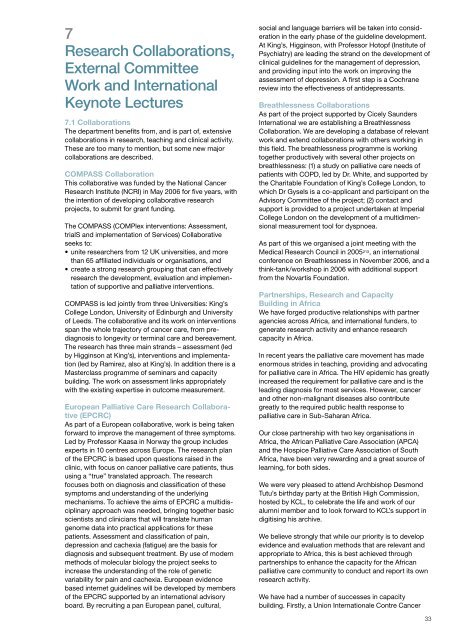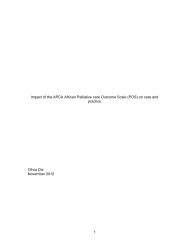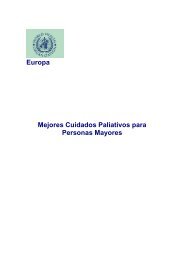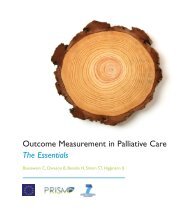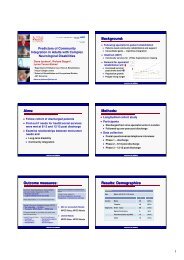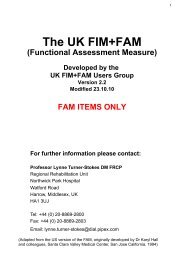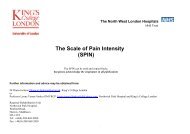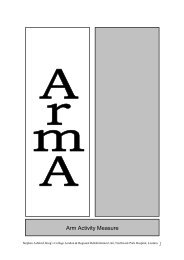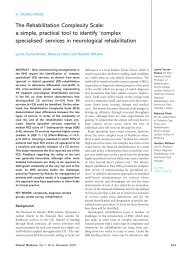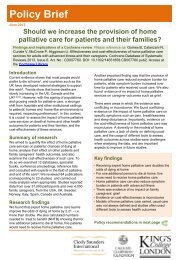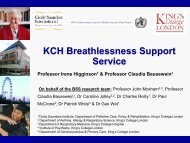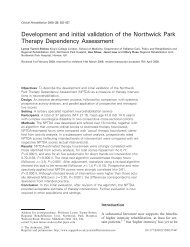2004 - 2007 - Cicely Saunders Institute - King's College London
2004 - 2007 - Cicely Saunders Institute - King's College London
2004 - 2007 - Cicely Saunders Institute - King's College London
Create successful ePaper yourself
Turn your PDF publications into a flip-book with our unique Google optimized e-Paper software.
7<br />
Research Collaborations,<br />
External Committee<br />
Work and International<br />
Keynote Lectures<br />
7.1 Collaborations<br />
The department benefits from, and is part of, extensive<br />
collaborations in research, teaching and clinical activity.<br />
These are too many to mention, but some new major<br />
collaborations are described.<br />
COMPASS Collaboration<br />
This collaborative was funded by the National Cancer<br />
Research <strong>Institute</strong> (NCRI) in May 2006 for five years, with<br />
the intention of developing collaborative research<br />
projects, to submit for grant funding.<br />
The COMPASS (COMPlex interventions: Assessment,<br />
trialS and implementation of Services) Collaborative<br />
seeks to:<br />
• unite researchers from 12 UK universities, and more<br />
than 65 affiliated individuals or organisations, and<br />
• create a strong research grouping that can effectively<br />
research the development, evaluation and implementation<br />
of supportive and palliative interventions.<br />
COMPASS is led jointly from three Universities: King’s<br />
<strong>College</strong> <strong>London</strong>, University of Edinburgh and University<br />
of Leeds. The collaborative and its work on interventions<br />
span the whole trajectory of cancer care, from prediagnosis<br />
to longevity or terminal care and bereavement.<br />
The research has three main strands – assessment (led<br />
by Higginson at King’s), interventions and implementation<br />
(led by Ramirez, also at King’s). In addition there is a<br />
Masterclass programme of seminars and capacity<br />
building. The work on assessment links appropriately<br />
with the existing expertise in outcome measurement.<br />
European Palliative Care Research Collaborative<br />
(EPCRC)<br />
As part of a European collaborative, work is being taken<br />
forward to improve the management of three symptoms.<br />
Led by Professor Kaasa in Norway the group includes<br />
experts in 10 centres across Europe. The research plan<br />
of the EPCRC is based upon questions raised in the<br />
clinic, with focus on cancer palliative care patients, thus<br />
using a “true” translated approach. The research<br />
focuses both on diagnosis and classification of these<br />
symptoms and understanding of the underlying<br />
mechanisms. To achieve the aims of EPCRC a multidisciplinary<br />
approach was needed, bringing together basic<br />
scientists and clinicians that will translate human<br />
genome data into practical applications for these<br />
patients. Assessment and classification of pain,<br />
depression and cachexia (fatigue) are the basis for<br />
diagnosis and subsequent treatment. By use of modern<br />
methods of molecular biology the project seeks to<br />
increase the understanding of the role of genetic<br />
variability for pain and cachexia. European evidence<br />
based internet guidelines will be developed by members<br />
of the EPCRC supported by an international advisory<br />
board. By recruiting a pan European panel, cultural,<br />
social and language barriers will be taken into consideration<br />
in the early phase of the guideline development.<br />
At King’s, Higginson, with Professor Hotopf (<strong>Institute</strong> of<br />
Psychiatry) are leading the strand on the development of<br />
clinical guidelines for the management of depression,<br />
and providing input into the work on improving the<br />
assessment of depression. A first step is a Cochrane<br />
review into the effectiveness of antidepressants.<br />
Breathlessness Collaborations<br />
As part of the project supported by <strong>Cicely</strong> <strong>Saunders</strong><br />
International we are establishing a Breathlessness<br />
Collaboration. We are developing a database of relevant<br />
work and extend collaborations with others working in<br />
this field. The breathlessness programme is working<br />
together productively with several other projects on<br />
breathlessness: (1) a study on palliative care needs of<br />
patients with COPD, led by Dr. White, and supported by<br />
the Charitable Foundation of King’s <strong>College</strong> <strong>London</strong>, to<br />
which Dr Gysels is a co-applicant and participant on the<br />
Advisory Committee of the project; (2) contact and<br />
support is provided to a project undertaken at Imperial<br />
<strong>College</strong> <strong>London</strong> on the development of a multidimensional<br />
measurement tool for dyspnoea.<br />
As part of this we organised a joint meeting with the<br />
Medical Research Council in 2005 213 , an international<br />
conference on Breathlessness in November 2006, and a<br />
think-tank/workshop in 2006 with additional support<br />
from the Novartis Foundation.<br />
Partnerships, Research and Capacity<br />
Building in Africa<br />
We have forged productive relationships with partner<br />
agencies across Africa, and international funders, to<br />
generate research activity and enhance research<br />
capacity in Africa.<br />
In recent years the palliative care movement has made<br />
enormous strides in teaching, providing and advocating<br />
for palliative care in Africa. The HIV epidemic has greatly<br />
increased the requirement for palliative care and is the<br />
leading diagnosis for most services. However, cancer<br />
and other non-malignant diseases also contribute<br />
greatly to the required public health response to<br />
palliative care in Sub-Saharan Africa.<br />
Our close partnership with two key organisations in<br />
Africa, the African Palliative Care Association (APCA)<br />
and the Hospice Palliative Care Association of South<br />
Africa, have been very rewarding and a great source of<br />
learning, for both sides.<br />
We were very pleased to attend Archbishop Desmond<br />
Tutu’s birthday party at the British High Commission,<br />
hosted by KCL, to celebrate the life and work of our<br />
alumni member and to look forward to KCL’s support in<br />
digitising his archive.<br />
We believe strongly that while our priority is to develop<br />
evidence and evaluation methods that are relevant and<br />
appropriate to Africa, this is best achieved through<br />
partnerships to enhance the capacity for the African<br />
palliative care community to conduct and report its own<br />
research activity.<br />
We have had a number of successes in capacity<br />
building. Firstly, a Union Internationale Contre Cancer<br />
33


